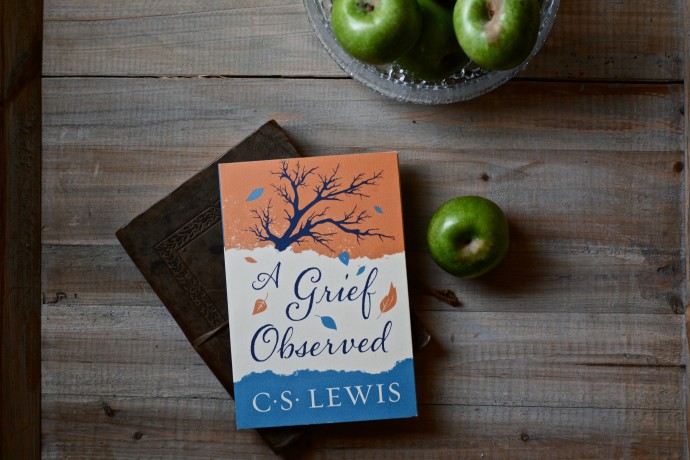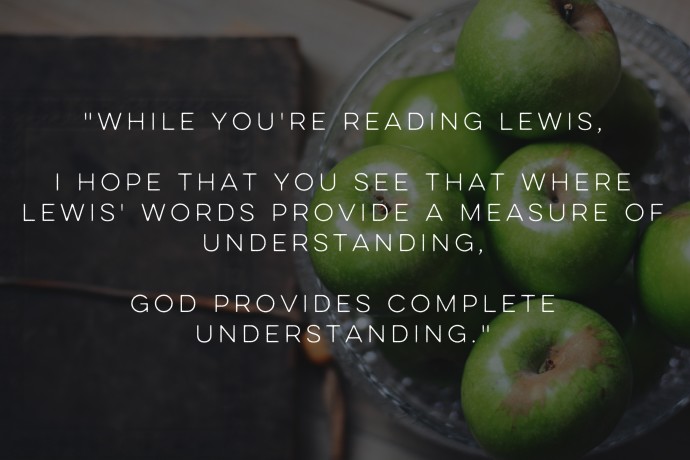Book Review: C.S. Lewis’ “A Grief Observed”
All griefs are different.
When I first started to read Lewis’ A Grief Observed, I was perhaps two weeks, at most, into grieving my stillborn daughter, Noelle. Stillborn — I hate that it is a necessary word to describe something that happens in this world. And there are more words and phrases that I hate along with it that have become a necessary addition to my everyday repertoire since working more closely with Hope Mommies, miscarriage and infant loss among them.
I do not write that bitterly. I write it truthfully (and humbly for that matter, considering the sin of my own human race brought death into this world).
I write it with what is, I imagine, somewhat similar attention to reality as Lewis when he wrote while grieving the loss of his wife to cancer:
It is hard to have patience with people who say, ‘There is not death’ or ‘Death doesn’t matter.’ There is death. And whatever is matters. And whatever happens has consequences, and it and they are irrevocable and irreversible.
What Lewis writes above is printed on page 15 of my copy of the book. And when I was in my first days of grief, I did not read this far into Lewis’ grief. I could not because after I read something of the following line, I put the book down, determining it was not for me.
Page 6 of my copy contains — “Why is He so present a commander in our time of prosperity and so very absent a help in time of trouble?”
I had already been helped by God and I knew it. I went to the hospital excitedly in labor with my girl only to find that her heartbeat was lost; my life with her was lost. Yet, my labor remained and progressed. HE carried me through labor and delivery with strength that was not my own. He had already been present with me from the first hours. Though I perhaps did not feel the overwhelming sense of Him I thought I might in tragedy, I also did not find Him to be absent. He was far from absent.
Every grief is different. I did not wrestle with the same questions as Lewis. I was turned away by his words on page 6 in those sacred-feeling days after my loss, considering them an invasion upon what I held to be true — what I had to hold as true. If I was to read an observation of grief in those early days, it surely was not supposed to be his. I knew one day I may read this book again and I imagined that Lewis came through his questions to find some hope. Knowing Lewis a tiny bit — and, yes, this is probably my favorite element in his writing — he would sacrifice nothing undeserving of sacrifice in his journey to hope. Surely, he would not gloss over death to reach hope. And yet, why would I want to go on his journey, entrenching myself in an observation of inner arguments I would never need to have with myself, when I had my own grief to navigate? I came to the right decision for myself to not read Lewis’ book.
And now, time has passed. There are parts of his book I find utterly unhelpful still. He makes many references to purgatory resulting in his lack of confidence in his wife’s destination after death. He questions the character of God while unable to “make it up” in the end. I do appreciate his faith in the end: “heaven will solve our problems.” Yet, he did not come through for me with a robust, heartfelt confirmation of God’s goodness, comfort, and constant presence — some of the very truths that help restore the souls to life in Him after grief. I am not critiquing Lewis as a person, indicating that Lewis’ recorded grief is subpar, nor am I reviewing this book as a piece of literature. I am critiquing it as a work for us, questioning whether or not — and how — it can serve us Hope Moms.
I imagine that many of us will walk in the same footprints Lewis left, questioning God’s goodness and questioning His presence. So, I have to ask: will this book lead you through these questions to any helpful resolution? It does not do so as I would like for it to. Though, still helpful, it does push us in the right direction quietly and infrequently.
Perhaps there are others like me who will make the mistake of going to it with that hope and expectation of Lewis guiding us through grief Biblically only to be disappointed. Don’t have false expectations. This book is what it says it is: an observation. It is not a guide and everything ought to be compared against Scripture.
Of some of our theological challenges in grief, Lewis is wonderfully honest and helps us understand the nature and implications of our human questions. Yet, his observation is not meant to serve as a robust declaration of the true nature or character of God, and I suppose this review is, in part, something of a warning to not read it that way. And if you are not looking for a discussion about these sort of questions, perhaps you will not want to read it right now at all.
So, now, correcting my own prior mistake and with a more proper perspective toward this work that only time could have afforded for me, I do have more variety in reaction to it. I once closed it, counting it an intruder. And now, I also find my heart shouting “yes!” while reading it too.
What I could most frequently find of earnest, heartfelt recommendation while reading was the honesty of Lewis’ descriptions about the daily, human aspects of our suffering. He rests upon no easy categories or cliches. And he does it without being void of hope. How freeing are some of his thoughts because we are, through him, both exposed and understood!
Let me give you an example. Lewis writes:
Still, there’s no denying that in some sense I ‘feel better,’ and with that comes at once a sort of shame, and a feeling that one is under a sort of obligation to cherish and foment and prolong one’s unhappiness…What’s behind it? Partly, no doubt, vanity. We want to prove to ourselves that we are lovers on the grand scale…But that’s not the whole of the explanation. I think there is also confusion. We don’t really want grief, in its first agonies, to be prolonged: nobody could. But we want something else which grief is a frequent symptom of, and then we confuse the symptom with the thing itself….I have discovered, passionate grief does not link us with the dead but…[makes] the dead far more dead.
We confuse the symptom of grief with our love for the person. When we un-confuse the two, we feel more freedom to move forward in life.
Or take these examples:
And no one ever told me about the laziness of grief…not only writing but even reading a letter is too much.
And:
I think I am beginning to understand why grief feels like suspense. It come from the frustration of so many impulses that had become habitual. Thought after thought, feeling after feeling, action after action…Not their target is gone.
Yes, how often I felt like Lewis understood!
These, and many more insights, help us because as it turns out, these human, daily aspects of our suffering — which is what so much of Lewis’ book is about — are actually monumental and spiritual. Because this is where we find often ourselves in grief. The daily and human is the very intersect where we seek God, who is the monumental and spiritual in our lives. In grief, we are caught in all sorts of silences, awkward conversations, completely new and intense feelings, loneliness-es, and sorrows that we never asked to be a part of our lives — much less that we have been prepared to face in this culture that very often shuns what’s sad. We’re stuck. We’re caught. And it’s real. It hurts. Often, we might not know how to say what it is or describe it. And what we really need is comfort and understanding, the real things. To state the obvious, God created C.S. Lewis. God is far more insightful and honest and engaging and truthful than C.S. Lewis.
You will find comfort in Lewis’ words as you read this book. You will find understanding. And I do hope you read the book for the opportunity to feel that. But even more and even while you’re reading Lewis, I hope that you remember that where Lewis’ words provide a measure of understanding, God provides complete understanding.
Lewis wrote:
What reason have we, except our own desperate wishes, to believe that God is, by any standard we can conceive, ‘good’? Doesn’t all the prima facie evidence suggest exactly the opposite? What have we to set against it? We set Christ against it.
Hope Moms, we set Christ against our doubts.
Read Isaiah 53:2b-9 like you are reading it for the very first time:
“He had no beauty or majesty to attract us to him,
nothing in his appearance that we should desire him.
He was despised and rejected by mankind,
a man of suffering, and familiar with pain.
Like one from whom people hide their faces
he was despised, and we held him in low esteem.
Surely he took up our pain
and bore our suffering,
yet we considered him punished by God,
stricken by him, and afflicted.
But he was pierced for our transgressions,
he was crushed for our iniquities;
the punishment that brought us peace was on him,
and by his wounds we are healed.
We all, like sheep, have gone astray,
each of us has turned to our own way;
and the Lord has laid on him
the iniquity of us all.
He was oppressed and afflicted,
yet he did not open his mouth;
he was led like a lamb to the slaughter,
and as a sheep before its shearers is silent,
so he did not open his mouth.
By oppression and judgment he was taken away.
Yet who of his generation protested?
For he was cut off from the land of the living;
for the transgression of my people he was punished.
He was assigned a grave with the wicked,
and with the rich in his death,
though he had done no violence,
nor was any deceit in his mouth.”
Because of Jesus Christ, God is both the “monumental and spiritual” and the “human and daily” when it comes to how we can relate with Him in suffering. God will not gloss over any of your pain when you go to Him and His Word. He is God; He is truth and He knows the truth of where you are at in your heart and mind. He is both God and man; He knows sorrow — sorrow even deeper than ours. And He knows you.
The very One grief may distance us from is the One we so need. We need who He says He is. And that includes “familiar with pain.”

Lianna Davis, Social Media Coordinator // You can read more from Lianna over at her blog, lovelysovereign.com
Follow our quote series through Lewis’ “A Grief Observed” on Instagram, running now through the end of November. Also, find all of the resources Hope Mommies recommends as well as a link to purchase Lewis’ book here.



